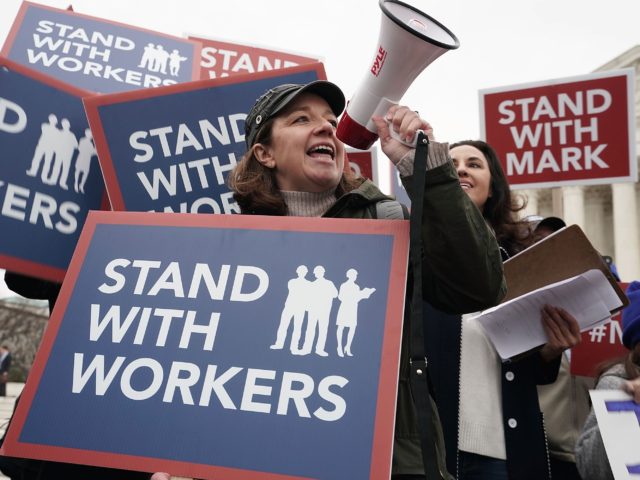Labor Unions Strike Back Against Janus Ruling in S
Post# of 65629

< >

Leaders of public sector labor unions are determined to use state legislatures to undermine the Supreme Court’s landmark decision in Janus v. AFSCME, which declared mandatory public union dues unconstitutional.
A report released at the Commonwealth Foundation calls attention to government union leaders’ campaigns in the states to bolster their power over workers.
https://t.co/M0Aq6RV3sN
— Right To Work (@RightToWork) September 2, 2019
“In many states, union leaders are using their considerable lobbying resources to slow legislation that would enforce Janus and to pass union-friendly bills,” said Charles Mitchell, president and CEO for the Commonwealth Foundation, in a press statement.
Union leaders are attempting to counter the increasing number of lawsuits alleging they have contrived obstacles to workers’ ability to leave government unions they were once forced to join and to collect refunds of past fees.
The labor unions’ campaign mimics that of other leftwing groups, such as the abortion industry, that claim a Supreme Court ruling in their favor is “settled law,” yet use their influence in state legislatures to undermine a potential Court ruling that is not to their advantage.
"America must do more to protect the dignity of every American worker against the injustices of compulsory unionism."https://t.co/0cJDEdbVqc
— Right To Work (@RightToWork) September 2, 2019
“According to Ballotpedia, as of early August 2019, 102 Janus-related state bills were introduced and seven bills backed by labor leaders were enacted,” states the Commonwealth Foundation’s report, adding:
A majority of these 2019 bills contained union-backed policies. They represented an effort to codify union privileges that may have simply been negotiated at the contract level before; shore up the scope of collective bargaining; and unionize new groups of government employees.
For example, both the state of Washington’s House Bill 1575 and California’s Senate Bill 846 declare government unions are not required to refund union fees forcibly collected from workers prior to the Janus decision.
Oregon had ten new labor bills in 2019, including House Bill 3009, in which public safety unions were successful in securing a win to maintain their agency fees by replacing them with “reasonable fees and costs for representation that are unrelated to the negotiation of a collective bargaining agreement.”
“In other words, the law is an illegal Janus workaround to maintain the union’s cash flow from agency fees and limit employees’ freedom of association—and is thus ripe for a court challenge,” states the report.
Republican Gov. Chris Sununu vetoed New Hampshire’s Senate Bill 18, which proposed voluntary union payments, the report notes.
“Continuing the payroll deduction for a month after a worker has chosen not to continue union membership falls outside the spirit of the Janus ruling and could potentially expose the state, counties and municipalities to litigation,” he said regarding his decision.
As the Commonwealth Foundation reports, union leaders in Oregon and California were also successful in codifying the practice of “release time” for union officials. The laws passed in these states require employers to grant union officials paid time off to conduct union business during their work day.
Legislation in other union-friendly states seeks to provide public sector employees’ private information to unions to assist in organizing, and to unionize new classes of workers with or without their knowledge or consent.
“This report warns that a Supreme Court decision is in danger of being undermined by politically savvy actors at the state level,” Mitchell said. “Advocates for workers cannot rest on their laurels and expect public employees’ newly-restored rights to be respected. States must pass laws that enforce and protect the Janus ruling.”
 (0)
(0) (0)
(0)